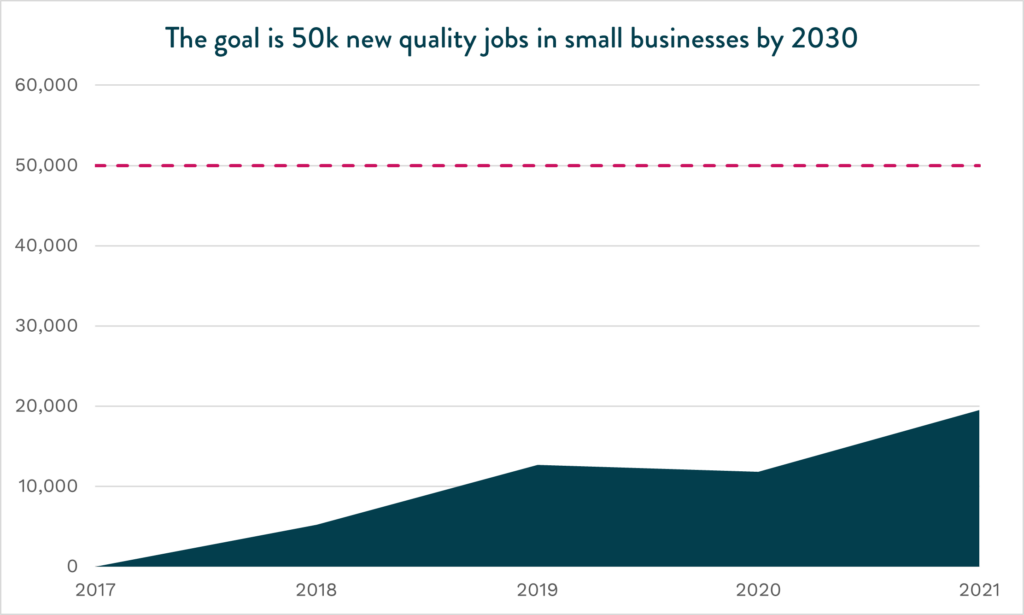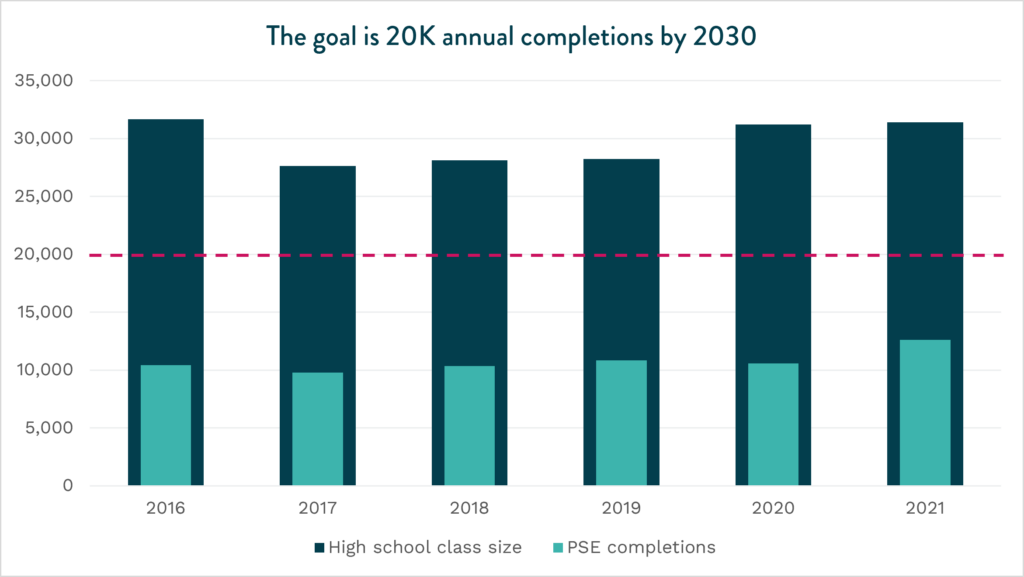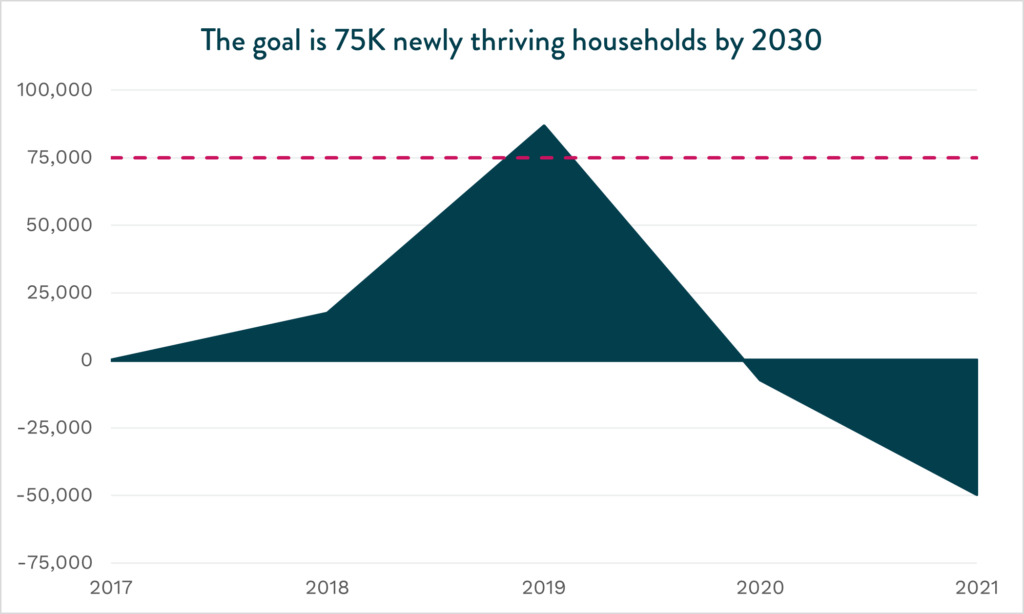Report: San Diego affordability crisis threatens latest jobs and talent gains
Today, San Diego Regional EDC released its 2023 Inclusive Growth Progress Report. With updated data and bold objectives set around increasing the number of quality jobs, skilled talent, and thriving households critical to the region’s competitiveness, the report measures San Diego’s growth and recovery, and spotlights the greatest threats to prosperity.
Making the business case for inclusion, EDC releases this annual report to track progress toward the region’s 2030 goals: 50,000 new quality jobs* in small businesses; 20,000 skilled workers per year; and 75,000 newly thriving households**. Since its launch in 2017, the initiative has rallied public commitments from County, City, academic, and private sector leaders who are leveraging the Inclusive Growth framework to inform their priorities, tactics, and resource allocation. While much about the economy remains uncertain, intentional and consistent efforts by a diverse set of regional stakeholders will be key to achieving these goals.
“Large and small businesses, nonprofits, and government all play important roles in building a strong local economy and expanding economic inclusion,” said Jennie Brooks, Executive Vice President at Booz Allen Hamilton and EDC Board Chair. “Booz Allen is empowering its employees with training in technologies such as Artificial Intelligence and is committed to helping prepare local, diverse San Diegans for tech careers of the future. We are proud to partner with local nonprofits and small businesses to make advanced technology broadly accessible to students and create a supportive ecosystem in San Diego to drive inclusive economic growth.”
THE STORY BEHIND THE DATA
Over the past decade, the San Diego region has experienced a notable upswing in general prosperity, standard of living, average wages, and productivity, including a full recovery from the pandemic across virtually every sector. Yet, these gains have not been evenly distributed.
In terms of racial, geographic, and overall inclusion, San Diego has slipped; the pandemic has hit lower-income households and minority communities hardest. The relative poverty rate has increased while median earnings and the household wage gap between white and non-white populations has widened. Record-level inflation has hit struggling San Diego households hard, and high operating costs have degraded the ability of businesses to attract and retain talent.
Despite these obstacles, San Diego is once again making headway on the quality jobs and skilled worker goals; see charts below. 2021 saw an uptick in small business jobs as well as the highest increase in post-secondary education (PSE) completions in more than a decade.


However, decreasing affordability coupled with uneven economic prosperity not only threatens that progress but indeed may mean that San Diego falls even further behind its peer metros on overall prosperity. The region now needs to add 125,000 newly thriving households by the end of the decade to meet the goal.
The region’s expensive and limited housing market has exacerbated inflation across all categories, with fewer than 44 percent of San Diego households considered thriving. The affordability crisis will primarily impact Black and Latino households, of which more than half are low-income, and continue to challenge employers’ ability to attract and retain talent—posing the single greatest threat to the region’s economic growth.

“While EDC’s report demonstrates San Diego’s remarkable resilience in the face of the pandemic, our jobs and talent gains are being diminished by the region’s affordability crisis. Unless we get this right, San Diego will always be catching up,” said Lisette Islas, Executive VP and Chief Impact Officer at MAAC, and EDC Vice Chair of Inclusive Growth.
Join the movement
Using a demand-driven, employer-led, and outcomes-based approach, San Diego private, public, and community leaders must deploy creative solutions to achieve these 2030 goals. EDC invites the community to join us at one of two upcoming webinars to learn more about the data and how to get involved:
- September 19, 11 a.m. – Register here
- October 17, 10:30 a.m. – Register here
“We’re seeing HR departments dissolve degree requirements, big buyers redirecting procurement spend, governments streamlining permitting processes, and developers prioritizing on-site childcare. This is the level of regional adoption required to move the needle on inclusion, and EDC is committed to continuing to tell a data-driven story to make the business imperative clear. San Diego’s future depends on it,” said Teddy Martinez, Senior Manager, Research, San Diego Regional EDC.
Read the full report at 2023.inclusivesd.org, and all previous updates at progress.inclusiveSD.org.
The initiative is sponsored by Bank of America, City of San Diego, County of San Diego, JPMorgan Chase & Co., San Diego Gas & Electric, Seaport San Diego, Southwest Airlines, and University of San Diego Knauss School of Business.
*Quality job = $45K wages + healthcare benefits.
**Thriving household = total income covers cost of living for renter- or owner-occupied households, at $79K and $122K respectively.